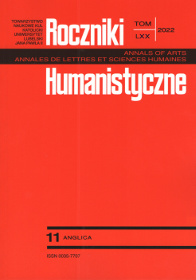Historicizing Contemporary Capitalism: Future Retrospection and Temporal Estrangement in Kim Stanley Robinson’s New York 2140 and Nora K. Jemisin’s Emergency Skin
Abstract
The paper looks at the historicizing approach adopted in two recent science-fiction books: Kim Stanley Robinson’s novel New York 2140 (2017) and Nora K. Jemisin’s novella Emergency Skin (2019). In both, the authors’ present is approached from the vantage point of a speculatively posited future and looked upon as the historical past of the text. The hypothesized temporal distance is meant to challenge and recalibrate the reader’s perception of contemporary capitalism.
Based on Robinson’s and Jemisin’s narratives, the paper discusses the historicity and mimetic potential of science fiction, manifested in the genre’s ability to situate the present as part of a historical process for an enhanced understanding of contemporary trends and their projected trajectories. In the two texts, the dichotomy between the envisioned future and the present-as-past is paralleled by a utopian/dystopian dialectic, wherein the reality of late capitalism is unequivocally identified as dystopian. The utopian and science-fiction perspectives combined produce the effect of cognitive estrangement, which entails a perceptual renewal with regard to capitalism, whose alleged incontestable status is challenged by the exposure of its historical mutability.
The aim of the analysis is to demonstrate that historicizing contemporary capitalism within science fiction may challenge the ideological hegemony of neoliberalism, expose its dystopian features, and indicate possibilities for the transformation of a system that proclaims to have no alternatives. Such historicization may produce an epistemic shift in the reader’s perception of the contemporary socioeconomic reality, by emphasizing both its unrecognized flaws and its (r)evolutionary potential.
References
Beaumont, Matthew. Utopia Ltd.: Ideologies of Social Dreaming in England 1870-1900. Brill, 2005.
Braudel, Fernand. The Mediterranean and the Mediterranean World in the Age of Philip II. Vol. 1, U of California P, 1995.
Curran, Dean. Risk, Power, and Inequality in the 21st Century. Springer, 2016.
de Vicente, José Luis. “Angry Optimism in a Drowned World: A Conversation with Kim Stanley Robinson.” CCCB, 31 Oct. 2017, www.lab.cccb.org/en/angry-optimism-in-a-drowned-world-a-conversation-with-kim-stanley-robinson. Accessed 14 Feb. 2022.
Freedman, Carl. Critical Theory and Science Fiction. Wesleyan UP, 2000.
“Interview with Kim Stanley Robinson.” Big Echo. Critical SF, www.bigecho.org/kim-stanley-robinson. Accessed 20 Feb. 2022.
Jameson, Fredric. Archaeologies of the Future: The Desire Called Utopia and Other Science Fictions. Verso, 2005.
Jameson, Fredric. “Progress Versus Utopia; or, Can We Imagine the Future?” Science Fiction Studies, vol. 9, no. 2, 1982, pp. 147–58.
Jameson, Fredric. Postmodernism, or, the Cultural Logic of Late Capitalism. Duke UP, 1991.
Jemisin, N. K. Emergency Skin. Amazon Original Stories, 2019.
Klein, Naomi. The Shock Doctrine: The Rise of Disaster Capitalism. Penguin, 2007.
Levitas, Ruth. Utopia as Method. Springer, 2013.
Robinson, Kim Stanley. New York 2140. Orbit, 2017.
Schmid, Helga. Uchronia: Designing Time. Birkhäuser, 2020.
Spiegel, Simon. “Things Made Strange: On the Concept of ‘Estrangement’ in Science Fiction Theory.” Science Fiction Studies, vol. 35, no. 3, 2008, pp. 369–85.
Suvin, Darko. Metamorphoses of Science Fiction: On the Poetics and History of a Literary Genre. Yale UP, 1979.
Copyright (c) 2022 Roczniki Humanistyczne

This work is licensed under a Creative Commons Attribution-NonCommercial-NoDerivatives 4.0 International License.





